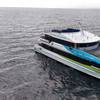Damen Intros BWPF Barge
Dutch shipbuilding conglomerate Damen Shipyards Group has unveiled a Ballast Water Pre Filtration Barge (BWPF) to assist vessels in complying with the IMO's Ballast Water Management Convention.
The new legislation came into force on September 8th 2019 and Damen Green Solutions has prepared a range of products and services to assist its clients in meeting the requirements of the new legislation.
The globally operating company with more than 50 shipyards, repair yards, and related companies said in a press note that the BWPF Barge can process up to 4,000 m3 water per hour with a sediment level anything between 50 and 1,500 mg per liter.
Filtration is available between 10 and 50 micron, to suit varying sediment sizes. The entire ballast water filtration system fits neatly inside a standard 40’ container, making logistics straightforward.
Many ports located on rivers throughout the world experience a sediment level significantly higher than the level onboard ballast water treatment systems are tested to.
Damen Green Solutions product portfolio manager Matthijs Schuiten explained, “The level to which on-board systems are tested demonstrates an ability to handle sediment levels up to 50 mg per litre. However, at some terminals, this level is exceeded – sometimes considerably. We recently ran tests on a waterway in the US close to a harbor, for example, and found sediment levels 30 times above this.”
Notable cases of important waterways that exceed the level to which on-board systems are tested include the Huangpu Jiang in Shanghai, the River Thames in London and the Red and Mississippi rivers in the US.
“Such high levels of sediment can cause ballast water filter blockage,” Matthijs continued. “This can make for huge operational challenges, preventing cargo unloading or ballast water intake.”
Damen’s answer is the new BWPF Barge, designed to go alongside a vessel at terminal and filter the sediment before ballast water is taken aboard.
“Pre-filtering the water in this manner ensures the ballast water system on-board is not blocked due to sediment. Having such capabilities enables terminals to add value with an additional service for calling vessels. With the IMO legislation’s passage into law, we expect to see demand for such services in the near future. Developing the BWPF Barge is Damen’s way of making sure that, when the need arises, we are prepared to respond quickly,” Matthijs concluded.













